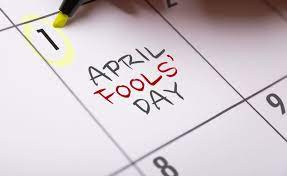
While the press once pulled spectacular pranks on April 1, they now have to tread carefully with fake news. A look at some funny journalistic fiction over the years.
Funnily enough, there is no definitive origin story for April Fool's Day.
The oft-repeated legend is that this day, when people hoax or prank others for fun, dates back to 1582, when France switched from the Julian calendar to the Gregorian calendar, as called for by the Council of Trent in 1563.
Up until Pope Gregory XIII introduced his Gregorian calendar in 1582, Europe had followed the Julian calendar, first instituted by Roman emperor Julius Caesar in 46 B.C., in which the new year began with the spring equinox around April 1.
Those who didn't get that memo — or pigeon post as it were — and who continued to celebrate the new year on April 1, soon became the butt of jokes and earned the ignominious title of "April fools."
Two other theories are also proffered. One links April Fools' Day to the ancient Roman festival of Hilaria, or Festival of Joy, which was celebrated on March 25 and dedicated to the goddess Cybele.
The other ties April 1 to the first day of spring in the northern hemisphere, where Mother Nature "fools" humans with changing, unpredictable weather, such as sleet one minute, sunshine the next.
Pranks over the ages have seen the fooled being tacked with paper fish on their backs, as in French they are referred to as "poisson d'avril" or April fish, referring to young, easily caught fish, or in other words, a gullible person.
Modern day pranks have seen everything from airlines to museums to zoos pranking people on April 1 over the years.
In 2010, Denmark's State National Historic Museum released a handout featuring a skeletal version of the city's famous tourist attraction "The Little Mermaid." A year later, staff at the Bristol Zoo Gardens performed tasks naked as part of "a fictional experiment into the sensory sensitivity of gorillas." In 2017, London's Madame Tussauds Wax Museum featured a special installation of "The Invisible Man."
But perhaps the best pranks have been pulled by the press — traditionally seen as the purveyors of truth — where for a day, journalists are allowed to release their inner fiction writers. The pranks were more impactful in the decades predating the internet and Google, where news was only available either in print or via radio and television. The truth was then revealed the next day or by discerning readers, listeners or viewers who detected the jokes between the lines.
The BBC leads the pack with what its competitor CNN referred to in 2009 as "the biggest hoax that any reputable news establishment ever pulled."
On April Fool's Day 1957, the BBC's flagship current-affairs program Panorama aired a three-minute hoax video that showed a family in southern Switzerland purportedly harvesting spaghetti from a "spaghetti tree." As spaghetti was a relatively unknown product in the UK back then, many viewers contacted the BBC for advice on growing their own spaghetti trees.
Viral joke or fake news?Today, with news going viral via social media, there's the risk of jokes being mistaken for fact and making global headlines, only to later backfire on a media already accused of proliferating fake news.
For instance, Futurism.com posted an article in 2017 with the headline "Pluto Has Been Officially Reclassified As A Planet!" and credited the status change to the International Astronomical Union. Despite being an April Fool's joke, this "news" was carried by other websites without any fact-checking.
Dictionary publisher Collins declared "fake news" as 2017's word of the year, prompting various newspapers around the world to refrain from the tradition of publishing April Fool's stories.
Magnus Karlsson, editor-in-chief at Swedish daily Smalandsposten, said on its website that he doesn't want the newspaper's brand "to be spread with a potentially viral and erroneous story."
"We work with real news. Even on April 1st," he said.
Meanwhile, notable pranksters including Google have been abstaining from the tradition since 2020, noting early in the COVID-19 pandemic that jocularity felt inappropriate at a time when misinformation abounded.
Here's a look at some (in)famous pranks that have made April 1 headlines:
1977: Do you know the way to San Serriffe?The Guardian reported on the 10th Independence Day of the tropical island of San Serriffe, a semicolon-shaped paradise near the Seychelle Islands. The seven-page report came complete with a map of the archipelago that featured places, ports and spots whose names were all word plays of fonts and typefaces.
1993: For procreation's sakeThe German Westdeutsche Rundfunk radio station announced a decree by Cologne city officials that joggers could only run at a maximum speed of 10 kilometers (six miles) per hour through the city's parks. A faster pace would not be conducive for squirrels in their height of mating season.
2009: Furor over fake pandasThe Taipei Times claimed that "Taiwan-China relations were dealt a severe setback yesterday when it was found that the Taipei Zoo's pandas are not what they seem." The paper reported that the pandas, a gift from the Chinese government, were brown forest bears dyed to resemble pandas. Among the complaints sent to the paper was one from the zoo's director.
2011: Adults-only flightsLow-cost airline Ryanair's March 31 press release that promised to introduce "child-free" flights from October 2011 was presumed to be an April Fool's joke, although it gained traction online.
One comment on USA Today's website read, "All airlines should offer child-free flights. If you have ever flown for six hours with some brat kicking the back of your seat the whole way, then you would agree." To date, no commercial airlines offer such flights.
2016: No nudity pleaseNational Geographic magazine announced via Twitter in 2016 that they would no longer be publishing photographs of naked animals.
But would the Bristol Zoo be interested in hiring the unemployed nude creatures for a future study?
2023: Classical groanersWith news outlets pulling back from public pranks, the slack in silliness seems to be taken up by brands announcing fake-yet-plausible new products on April 1.
But in 2023, US public broadcaster National Public Radio went against the media trend and aired a segment about a supposed archaeological dig by university students at the "Roman Ridiculum Amphitheater" who found an ancient papyrus scroll featuring — dad jokes.
Called the "Liber Patavinus," the find featured such groaners as: "Did you hear the rumor about butter? Well, I'm not going to spead it!"











